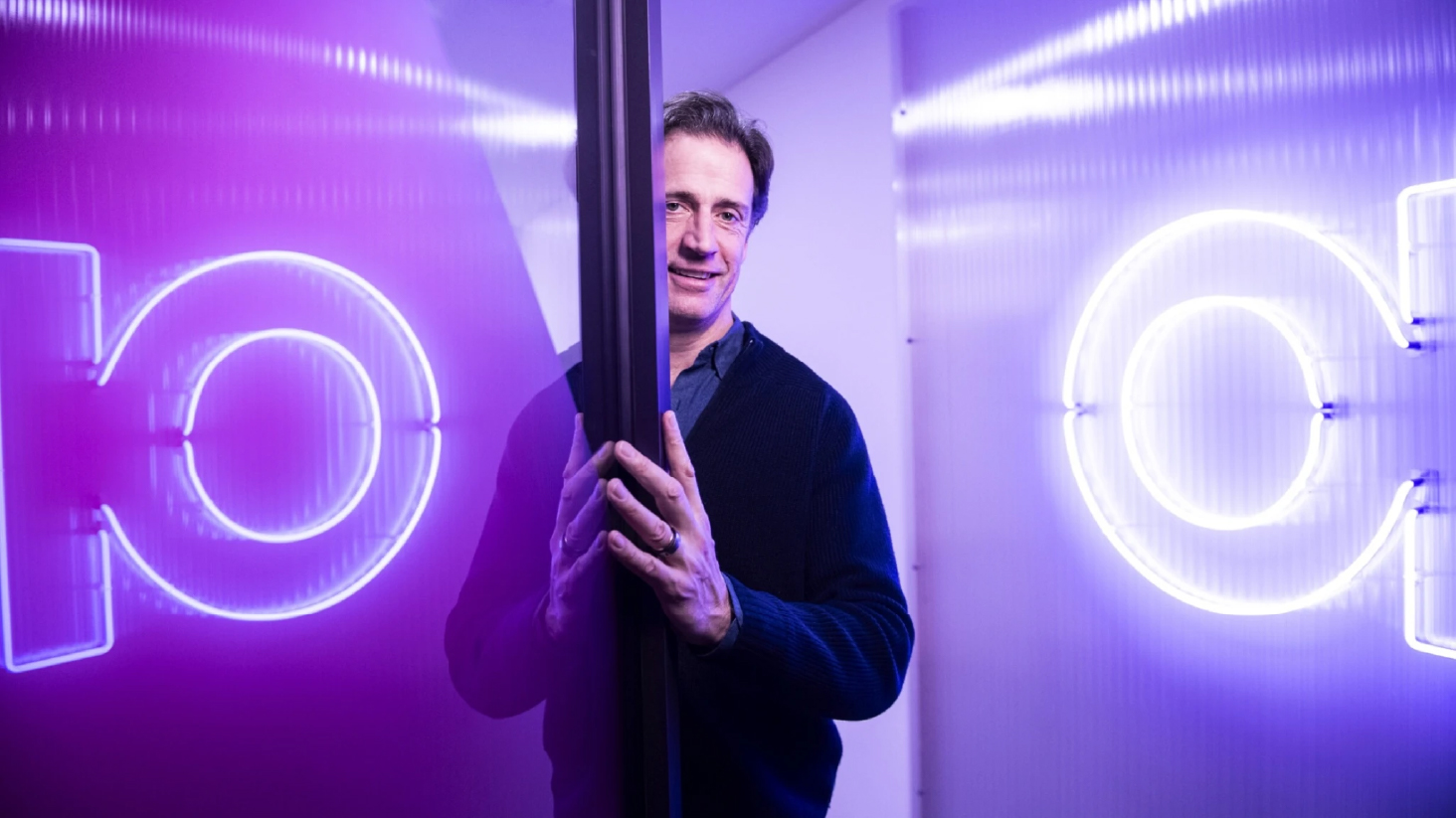When hockey keeps making thematic appearances in an interview with the CEO of a billion-dollar company, it might seem just like a casual connection between two people who see the puck sport as a form of art. But this case is different—not just because the CEO’s brief stay in Prague coincided perfectly with the company-wide hockey match.

Mike McKee distinctly stands out among top executives due to his previous career in the NHL, experiencing Jaromír Jágr’s winning era and recording the last assist of his career against a young Dominik Hašek. Those days have long passed, and after leaving hockey due to concussions, he has since excelled even further in management roles. This journey eventually led him to head the Czech founded software company Ataccama since 2023.
Ataccama specializes in helping enterprise companies build trust in their data to make business decisions faster, through Ataccama ONE data trust platform which includes data quality, lineage, observability and master data management in one, unified solution. Its annual recurring revenue (ARR), a crucial metric for IT companies, is now over 60 million dollars—around 1.4 billion Czech crowns. Considering the typically high valuation multiples of software companies, the billion-dollar mark isn’t far off.
(NOTE: All figures in this article reflect Ataccama's financial results at the time the interview was conducted in Q1 2025.)However, McKee’s objective to build a great company isn’t his only focus. His interests lie elsewhere, evident from one of our hockey-themed digressions.
“Did you watch the Four Nations Tournament final?” he recalls the historic February showdown between Canada and the USA, a match he attended front-row in Boston, home to Ataccama’s U.S. headquarters. “The best hockey I’ve ever seen!”
In other words, while during McKee’s professional playing days it seemed impossible to skate faster and shoot more accurately, exactly that has happened. Similarly, the same acceleration is taking place in the IT sector, propelling Ataccama into realms previously considered nearly unreachable.
“What investors are looking for is the new Informatica,” McKee emphasizes, referring to the software giant currently valued at around 5.5 billion dollars on the stock exchange.
That’s a long journey, something McKee quickly highlights—but the groundwork is laid. For the fourth consecutive year, Ataccama has been named a Leader in the prestigious Gartner Magic Quadrant for Augmented Data Quality, a recognition for the ability to deliver strong, core data quality capabilities that data leaders need for robust data governance, AI adoption, and business growth.
“To sum up our mission simply: to power a better future with data. Things can improve if we use more data—but it has to be the right data, the kind you can trust,” McKee explains.
The demand for these services is enormous, offering massive opportunities for Ataccama. The era favors the ambitious, particularly those leveraging artificial intelligence effectively.
“AI is like having two hockey players instead of one: one passes, the other shoots and always scores because they know exactly where the goalie is positioned,” McKee opens his major interview for Forbes with an apt hockey metaphor.
What kind of year has Ataccama had?
A really good one. And I don’t just say that casually—I always rely on data. When we last met, I talked about our company culture, teamwork, employee care, and customer prioritization. Today, however, I can say our eNPS (Employee Net Promoter Score) improved by over 50 points in 2024”.
It’s worth noting these numbers are usually higher in North America, where people are quicker to say they’re doing great—while Central Europeans typically settle for “okay.” But now we have data proving our strategies are genuinely working and our eNPS is at a world class level.
How does this show up in practice?
During a multi-day top management meeting last year in Prague, we had about twenty new people among the fifty attendees. Yet you couldn’t distinguish who was new and who had been here for years. To me, that was amazing.
Let’s move to numbers
New orders increased by 100 percent year-on-year in the second half of 2024. Last March, when shareholders asked me about growth, I said it would take time due to our sales cycles lasting nine to twelve months. Ultimately, our ARR grew by 30 percent year-over-year, nearing 60 million U.S. dollars.
Why emphasize this?
Because when we set our 2025 goal in September 2023 to achieve 100 million Canadian dollars in ARR (around 75 million USD), we’d already exceeded our interim targets. So now, our revised goal is 100 million USD in ARR by 2026, and ideally, we'll also become profitable next year.
Why not this year?
We could be profitable already if we wanted, but we consciously chose continued investment. Opportunities in the market are abundant, and we don’t want to choke off this potential—our target is breaking even.
Last autumn, Hospodářské noviny reported owners Jan Mrázek, Jan Červinka, and Petr Jech were allegedly seeking buyers in America. Your comment?
Shortly after that we had a meeting with Bain Capital Tech investors and we joked that Jan, Jan, and Petr are great businessmen – they never reveal their cards and the same applies here. But seriously, I'd wager they see significant growth potential remaining in software firms today.
For example, a 500-million-dollar ARR business can be worth between five to ten billion dollars. It remains a massive challenge and distant goal requiring significant effort. In our industry, you either keep growing or lose relevance.
I strongly believe in market potential, our team, and competition. Frankly, people are waiting for the next Informatica. Yet we’re living in unstable times, especially with your strong focus on North American markets. You’re absolutely right—uncertainty is our key word, and nobody likes uncertainty. Recently, we lost a potential deal with an energy company significantly exposed to Canada. Surprise, right? Again, it highlights what we can and cannot control.
There is good news for us: we don’t urgently need investor money, we don’t need to do a rushed IPO. Regarding customers, then yes – we focus more on financial sectors rather than industries severely affected by current events.
What does this overall uncertainty mean for the Ataccama’s plans?
Let me start from a bit of a different angle. Before the world entered its current state, one of our goals for this year was to keep building destination Ataccama – a workplace for all the best people, best partners and best customers. In this regard we are very strong in Czechia and Slovakia. I personally believe that companies no longer have headquarters – that’s gone, instead we have hubs in Toronto, Boston, London, Prague, Brno and Bratislava. Prague, Brno and Bratislava are our core hubs for product and engineering.
While there is an exception to every rule, I generally prefer to have people in the office, two or three days a week. That's why it’s one of our principles to have 80% of our employees within one hour commute from one of these hubs. When you intend to build your company on energy and trust then you can’t do it solely through online.
We also have a number of new brilliant people including new senior hires from Sentinel, Productboard and Microsoft. Last year (2024) we hired 133 people, around 20% of total Ataccama headcount. The general rule is that for building a successful company culture, you should stick to 10-15 %. We were dealing with this before the overall uncertainty in the world set in. And then people were asking me: does this limit us?
And does it?
My answer is that we need to be able to deliver results. We have two phenomenal quarters behind us, we have made significant progress year over year. But when it took me a year to get all of the team on my side, then it’s going to take two years with investors. Ideally you want to look for new investors in the times when your valuation is at its peak – and I firmly believe that you need to grow into your valuation. If in reality you lag behind your valuation, it can and it will lead you in the wrong direction.
So back to your question: our goal is definitely to grow. But I’d say that the absolute growth will come more likely in 2026 than this year.
Let’s address the two key letters of today’s world: AI – buzzword or a game changer?
A total game changer. I will give you an example from the day before I came to Prague: I was visiting Lloyd’s, one of our largest customers and one of the largest UK banks. First we were talking about regulations and then we came across the question of migrating data into the cloud. When you are moving such quantities of data for that much money, you don’t want to transfer trash, but only the right data in the right quality. And the third topic was AI – that’s why I was sitting there with people on the data team who answer to the CEO, CFO and CDO (Chief Data Officer). All these three people are interested in what we do.
AI is a game changer for us because there’s gigantic demand for great software that will make people and companies trust their data more. There’s twice the amount of data and twice the demand, but nobody can get four times more people to handle all that. You cannot grow your teams like that, so the only solution is AI – generative artificial intelligence and machine learning to be specific.
What does Ataccama do differently?
With the help of consultants from Bain Capital we’ve established our internal AI council and its aim is clear: what can be improved using AI? It can be marketing, development, finances, company culture, anything. It is always good to have relevant metric at hand, because then it gets the attention of the management – so one of our goals is to have 70% of our customers using the latest version of our united cloud platform, which is already built on genAI.
My responsibility is to ensure that we are dedicating adequate attention to AI on all levels. I personally see a fundamental difference between AI and genAI. Some think that it is purely a better chatbot, but that’s not the case. You use AI to help you do something faster, genAI will do it for you.
So you can’t afford not to use AI? With no regard for potential risks?
AI is another internet. When the internet came, everyone was afraid of it, that everything would be there. It was the same when Cloud came. And now there’s a new batch of brand new – legitimate – concerns and we definitely need to solve them. How to keep AI under control? What if it gets out of control? There are many questions, but the same way the internet didn’t die out, neither will AI. The internet sped up the growth of business and innovations and AI will do the same. We need to be open to changes.
Are these exciting times for a CEO of a company with global ambitions, or is it more stressful?
Ataccama is the strongest in something that was there long before I came in: people enjoy climbing mountains. To add relevance to your question – yes, the mountains are definitely higher than they used to be.
My 23-year-old daughter – same as I – loves spending time in nature and recently we’ve decided to climb a mountain on our skis. Instead of a one-hour walk it was a three hour trip and it was colder and windier than I had anticipated. So I had a lot of time to think and only grew more convinced that the world is changing and therefore we need people who enjoy conquering mountain summits. Even when they are higher than they were not so long ago.
NOTE: this blog post is a shorter version of the original interview conducted by the Czech Forbes and published here.
